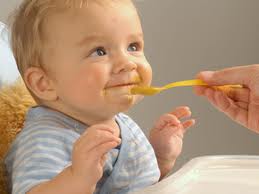Studies indicates that infants who grew that quickly face double the risk of being obese at age 5, compared with peers who grew more slowly. The study also suggests the risk at the age of 10 later.
Early signs of childhood obesity could be detected in the weight gains of infants as young as 6 months old following the growth chart which used to measure the babies’ weight. The doctors will record the infant’s weight-for-height during early life which can affect their childhood obesity risk. Accordingly, for infants whose chart numbers climbed much during their first 6 months, the risk is often highest.
The study now raise awareness for parent of the bigger is not always the better to their babies. That means their infants are currently overfed or kept inactive in the strollers and lack of crawling around . If your babies are among these cases, then you should change another child care plan. However, it is not fully guided that parents should feed babies less and unfairly label them as fat.
The study may uphold a concern that how useful the study is to prevent the obesity risk on babies.
As doctors said that majority of young patients whose parent fed them with too much juice or solid foods. In fact, nutritionists recommends that during the first 6 months, infants should be completely fed with breast milk or enough formula for the best.
At the same time, parents should consider, or, the best, avoid sugary beverages and giving babies more opportunity to move instead of protecting them all day in a stroller. Recording babies growth for both weight and height which must be moderate. Do not overfeed them which can lead to unnatural weight gain and increase risk of obesity, more likely Type 1 Diabetes later.
Experts also suggest babies should be jointly have meals with the whole family and not too strict diet at all.
That is the study from Harvard Medical School.

